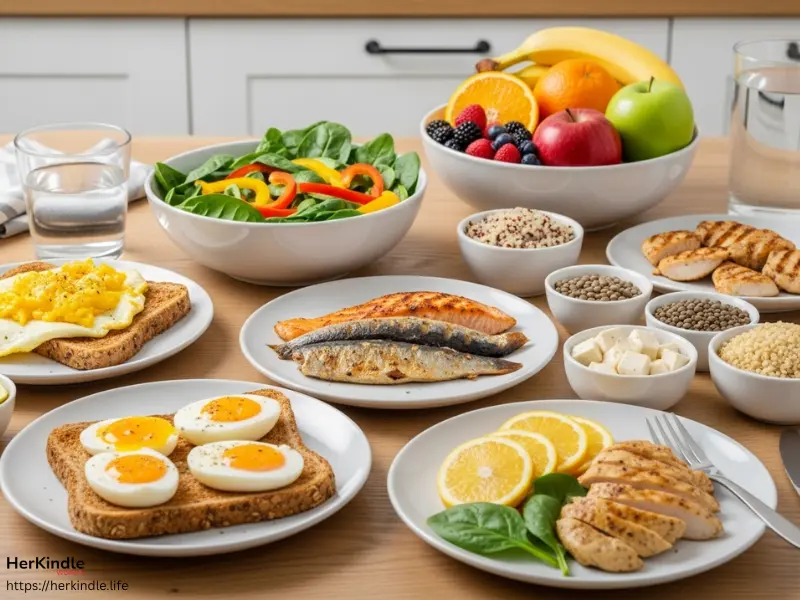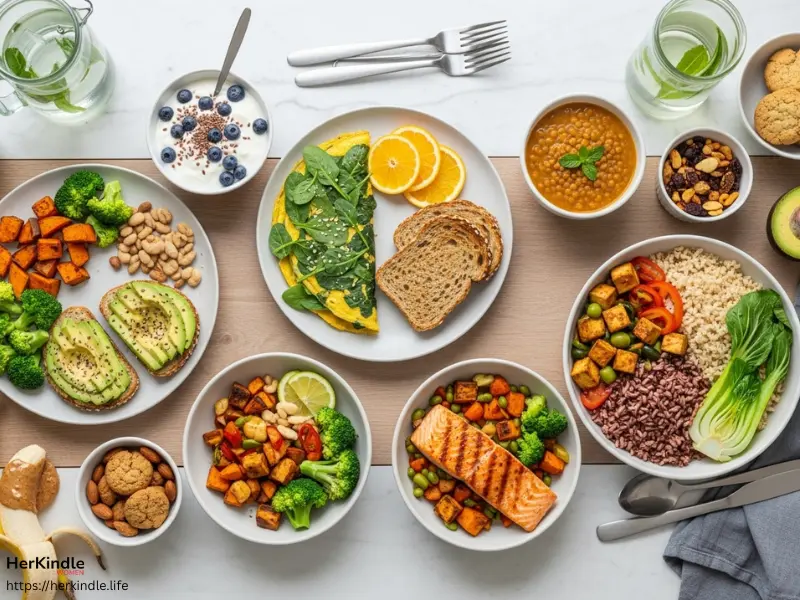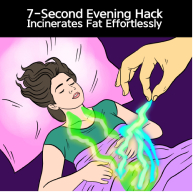The journey into motherhood is transformative—physically, emotionally, and mentally. For women over 35, this transition brings unique challenges, but also profound strength. Postpartum recovery demands more than rest—it requires intentional nourishment.
In this comprehensive guide, we’ll explore how a well-designed postpartum diet can speed up healing, enhance breast milk quality, stabilize mood, and build resilience during the “fourth trimester.”
Whether you’re recovering from a C-section, managing fatigue, or simply striving to feel like yourself again, this guide will equip you with the insights you need to make informed choices for your body and mind.
The Fundamentals of Postpartum Nutrition
Why Postpartum Nutrition Is Non-Negotiable
After childbirth, your body is in recovery mode—healing tissues, replenishing lost nutrients, and producing breast milk. According to registered dietitian Dr. Mary Weiler, postpartum nutrition is vital not only for recovery but also for lactation and maintaining energy levels.
Women over 35 may face slower tissue regeneration and hormonal imbalances, making a nutrient-dense diet even more crucial.
Key Nutritional Needs
- Calories & Protein: Breastfeeding mothers require ~500 extra calories/day and increased protein for tissue repair.
- Iron: Essential to replenish blood lost during childbirth.
- Folate: Supports DNA synthesis and cell regeneration.
- Choline & Iodine: Critical for brain development in babies and milk production.
- Vitamin A & B12: Important for skin health, energy, and red blood cell production.
Best Postpartum Recovery Foods

1. Eggs – The Postpartum Superfood
Rich in protein, choline, and B12—eggs support recovery and lactation. They’re quick to cook and versatile.
2. Low-Mercury Seafood
Salmon, sardines, and trout are rich in omega-3 fatty acids that boost brain health and reduce inflammation. Avoid swordfish and king mackerel due to mercury content.
3. Leafy Greens and Bright Veggies
Spinach, kale, and bell peppers offer iron, calcium, fiber, and antioxidants. These support immunity and energy regulation.
4. Whole Grains
Brown rice, oats, and quinoa provide slow-releasing carbs for sustained energy and digestive support.
5. Lean Proteins
Poultry, tofu, lentils, and beans aid muscle repair and are essential for milk production.
6. Fruits for Hydration & Immunity
Berries, citrus fruits, apples, and bananas deliver fiber, vitamin C, and hydration while curbing sweet cravings naturally.
Foods to Avoid After Giving Birth
Even though pregnancy restrictions are over, some foods can still hinder healing or affect your baby through breast milk:
- Caffeine: Limit to 2-3 cups per day to prevent irritability in infants.
- Alcohol: Wait at least 2-3 hours per drink before nursing.
- High-Mercury Fish: Avoid bigeye tuna, shark, and tilefish.
- Highly Processed Foods: These can spike blood sugar and worsen fatigue and mood swings.
- Potential Allergens: Monitor your baby’s reactions to common triggers like dairy or eggs.
Creating a Practical Postpartum Meal Plan
Postpartum Meal Planning Goals
- Nutrient Density over calorie counting
- Meal Convenience for low-energy days
- Hydration to support milk supply and prevent fatigue
Sample Meal Ideas

Breakfast:
- Greek yogurt + blueberries + flaxseeds
- Spinach omelet + whole grain toast + citrus slices
Lunch:
- Lentil soup + avocado toast
- Chicken quesadilla + black beans + guacamole
Dinner:
- Salmon + roasted sweet potatoes + broccoli
- Tofu stir-fry + brown rice + bok choy
Smart Snacks:
- Banana + almond butter
- Trail mix with walnuts, raisins, and pumpkin seeds
- Lactation cookies with brewer’s yeast and oats
Nutrition and Mental Health: A Vital Link
Nutrients That Fight Postpartum Depression
Emerging studies highlight a strong connection between nutrient intake and mood stability postpartum.
- Omega-3 Fatty Acids: Found in fish and walnuts, these reduce inflammation and support serotonin production.
- B Vitamins (B6, B12, Folate): Crucial for mood regulation.
- Vitamin D: Low levels are linked to increased risk of depression.
- Zinc: Supports neurotransmitter function.
The Gut-Brain Axis
Recent studies suggest dietary fiber supports a healthy gut microbiome, which may reduce the risk of depression.
Postpartum Meal Plan for a Week
Here’s a realistic 7-day postpartum meal plan designed for women who need simplicity without sacrificing nutrition:
| Day | Breakfast | Lunch | Dinner | Snacks |
|---|---|---|---|---|
| Mon | Oatmeal + berries | Chicken salad wrap | Quinoa + stir-fried tofu | Hummus + carrots |
| Tue | Veggie scramble + toast | Lentil soup | Grilled salmon + sweet potatoes | Yogurt + granola |
| Wed | Smoothie (spinach, banana, protein) | Brown rice bowl with edamame | Baked chicken + roasted carrots | Avocado toast |
| Thu | Frittata | Tuna wrap + spinach | Turkey chili | Apple + nut butter |
| Fri | Banana pancakes + almond butter | Leftover chili | Baked cod + greens | Boiled eggs |
| Sat | Chia pudding + mango | Bean and cheese quesadilla | Pasta + veggie sauce | Energy bites |
| Sun | Avocado egg salad | Chicken noodle soup | Shrimp stir-fry + rice | Cottage cheese + peach |
Cultural Approaches to Postpartum Nutrition
In many cultures, food is a love language during postpartum:
- Chinese: Hot soups and warming herbs to restore “Qi”
- Mexican: Broths and atole to rebuild energy
- Vietnamese: Rice and chicken-only meals early postpartum
- Tunisian: Zrir—a mixture of sesame, nuts, and honey—offers rich postpartum nourishment
These traditions highlight the universal need for warmth, nutrient-density, and digestibility during recovery.
Supplements and Special Considerations
While food is the foundation, some women—especially vegans or those with medical conditions—may need supplements:
- Iron: For anemia
- Vitamin D: Especially in low-sunlight areas (Canada, northern US)
- B12 and Choline: Essential for vegans
- Calcium & Iodine: Needed in higher amounts during breastfeeding
Always consult your healthcare provider before starting supplements.
Weight Management After Birth
Gradual is best. Aim for no more than 1 pound/week. Rapid loss may affect milk quality and energy levels.
Focus on:
- Regular meals
- Nutrient-dense snacks
- Walking or light yoga as cleared by your provider
Frequently Asked Questions (FAQ)
Eggs, leafy greens, lean meats, low-mercury seafood, and whole grains.
Yes, in moderation. Limit to 2-3 cups daily.
Yes. A postpartum meal plan helps reduce decision fatigue and ensures consistent nutrient intake.
Choline-rich foods (eggs), omega-3s (salmon), and hydration-boosting fruits.
Eat balanced meals every 3-4 hours and hydrate throughout the day.
Conclusion
Postpartum healing is not just about bouncing back—it’s about building a stronger, healthier version of you. The right foods can be your most powerful allies in this journey.
By focusing on real, whole foods, listening to your body, and honoring your unique recovery path, you empower yourself to not only care for your baby—but for your thriving self.
💬 If you found this guide helpful, consider sharing it with a fellow mom or bookmarking it for easy reference. For more nurturing resources, visit herkindle.life.







